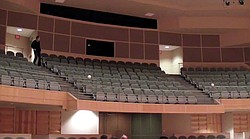Arts & science intersect
By Don Shilling
Researchers visit DeYor, hope laser experiments aid concert halls worldwide concert halls across world
A German engineer tapped on a keyboard as part of his performance Friday at a downtown Youngstown concert hall.
Eike Thiele wasn’t producing music, but a three-dimensional, computer model of the interior of Ford Recital Hall at DeYor Performing Arts Center.
His instrument was a photon laser scanner that can measure 28 million points a minute by bouncing laser beams off the surfaces in the hall.
Thiele came to Youngstown as part of an unusual partnership among a local business, the concert hall and Youngstown State University.
They are out to learn if the latest computer modeling techniques can be used to improve acoustics — not just at Ford Recital Hall but at halls all over the world.
The computer model is the first step. It will be created by M-7 Technologies of Youngstown, which will combine about a dozen of Thiele’s scans. Each scan takes about five minutes.
The next step will be to measure the acoustics of the hall and convert that to a digital file as well. Then, high-powered computers will play the digital music inside the digital model of the hall. Organizers will perform virtual experiments by adding sound-absorbing panels to look for ways to improve the hall’s performance.
Mike Garvey, M-7 president, said he isn’t aware of any concert hall that has used a laser-scanning model of its existing space to improve its acoustics.
The idea was born over a backyard dinner with his neighbor, John Wilcox, who teaches violin at YSU’s Dana School of Music. The two were talking about laser scanning and acoustics, when they realized there might be a connection.
“This is a marriage between industry and science,” Garvey said.
Wilcox was so enthusiastic about the idea that he took a sabbatical from his teaching position so he could do further research into acoustics.
DeYor Performing Arts Center was happy to join their effort by offering the Ford hall as a testing ground. The 600-seat hall was completed in 2006 as a complement to the larger Powers Auditorium.
Joe Woronka, facility manager, said Ford’s acoustics are good, but the scanning will show the hall as it was actually built, not as it was designed.
Architects make digital models of buildings from their drawings, but changes are made as buildings are completed, he said. Besides, the scanning is the most accurate measuring tool available, he said.
“In acoustics, a few inches on an angle can change the world,” he said.
Woronka hopes the new information will help him decide when he needs to put up some sound-absorbing panels, and where they should be placed. Different acoustical treatments are needed depending on the type of group performing, whether its classical or jazz, for example.
Right now, he has to rely on an educated guess. Garvey said he is offering the scanning for free as a service to the community.
The acoustical work is a spinoff of a $1.6 million contract that a local consortium received to study how acoustics affect military aircraft, Garvey said. The consortium included YSU, M-7 and others.
In the past few years, M-7 has been doing industrial scanning in a partnership with Thiele. The German engineer now is creating a North American unit of his consulting business and basing it at M-7’s plant in the Ohio Works Industrial Park. His new company is affiliated with the Youngstown Business Incubator.
M-7 and Thiele have used scanners to measure auto plants, steel mills and other factories to determine the most efficient ways of installing equipment or making renovations. Garvey’s company employs 17, and it also repairs industrial equipment.
Garvey hopes the work at Ford Recital Hall will build a business case using the technology at concert halls. Woronka noted that the scanning could be used in any building — even in a lobby or hallway that doesn’t handle sound well.
Wilcox said he thinks concert halls across the world would be interested in the technology if it helps them know what changes can enhance different types of sounds.
“There is no perfect hall that’s ever been built,” he said.
shilling@vindy.com
 43
43

